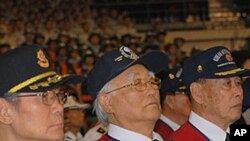South Korea marks the 60th anniversary Friday of the three-year war with the North. The conflict ended with a truce in 1953 and the Korean peninsula has remained in an uneasy state between war and peace.
At a subdued ceremony in an Olympic gymnasium, South Korea paid tribute to its soldiers and allies who fought under the banner of the United Nations.
Combat and support units from 21 countries arrived after North Korean forces crossed into the South on June 25, 1950.
Addressing the veterans, South Korean President Lee Myung-bak said his country's ultimate goal is not another military confrontation with the North, but peace.
President Lee says for that to happen North Korea must stop reckless military provocations, such as the torpedo sinking of the Cheonan warship three months ago, which killed 46 South Korean sailors.
The president called for Pyongyang to clearly confess to sinking the vessel, apologize, and take a responsible attitude in front of the international community.
The March 26 incident has raised tensions on the Korean peninsula.
North Korea denies involvement and has warned that any moves by the United Nations to punish it could lead to renewed war.
President Lee is expected to discuss the U.S. and South Korean response to the Cheonan incident Saturday on the sidelines of the G20 Summit, in Canada.
|
Some U.S. veterans returning to South Korea for the war anniversary are calling Seoul's public tribute to the allies long overdue.
Robert Fletcher is one of them. He arrived in Korea in 1950 as a 17-year-old private first class with the 24th Infantry, a regiment composed solely of African-American soldiers. Fletcher remains bitter that the achievements of his heavily outnumbered unit at Busan have been overshadowed in history by the subsequent counter-attack by U.S. Marines.
"We destroyed three divisions of North Koreans and then went back to our position," he said. "People don't understand it. If we hadn't held, the [U.S.] Marines would have never landed up at Incheon."
Fletcher would later be captured by the North Koreans and spend 33 months as a prisoner of war.
What also seems to be making a profound impact on the returning veterans is how South Korea rebuilt and became so prosperous. It is now Asia's fourth largest economy.
"It's completely different than I remember," said Joseph O'Brien, a U.S. Army private first class during the Korean War. "When I was here, there was nothing. Everything was blown up. Nothing but dirt roads. Everything now is so modern. It looks great."
The United States dispatched nearly 1.8 million troops, sailors and airmen to Korea during the war, making it the largest member of the 21-nation coalition. More than 36,000 Americans were killed. But the Korean people suffered the most with an estimated 2.5 million perishing during the 37 months of war.




